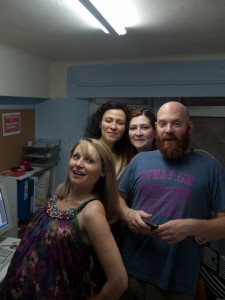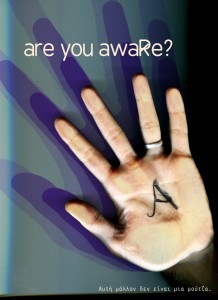This post has been was a work-in-progress ever since I got back from France in August. A major contributing factor for this delay has been a certain game I’ve put close to 4 full days into in the past month. Another has been my enduring inability to prioritise my activities, declutter my life and put my thoughts and feelings in order. I have found that creation is what I need, a positive step in the right direction. Writing more and returning to Cubilone’s Dimension will prove to be, I hope, a step towards solving these problems. Actually, solving them sounds a bit alien; I can’t really imagine myself living without these aspects of my personality. Is this my personal story sabotaging my development? Have I made a self-fulfilling prophecy out of trying to form or carve my identity? Hmmm…
As the months pass by and my post-study period grows longer, the dilemmas grow larger and scarier and often I feel as if I’m stuck in the middle of two worlds.
This summer, after our fantastic experience in Finland in June, two important things happened:
The first one was that, after many years of thinking it over, I finally did my CELTA course, which means that I’m now an internationally certified English teacher, or at the very least I’m elligible to teach pretty much anywhere in the world. For four weeks, eight hours each day, I learned how to teach the English grammar, vocabulary, phonology, various methods, what one should and shouldn’t do… At least the basics, for it’s of course a lifelong process, as is everything. The toughest part was that my 9 colleagues and I each had to teach eight lessons, totalling six hours, which we had to plan thoroughly beforehand as well as execute the best we could in the classroom, teaching real students (who by the way did not have to pay money to learn English because it was trainees teaching them) and later receiving feedback on those lessons from our colleagues and tutor.
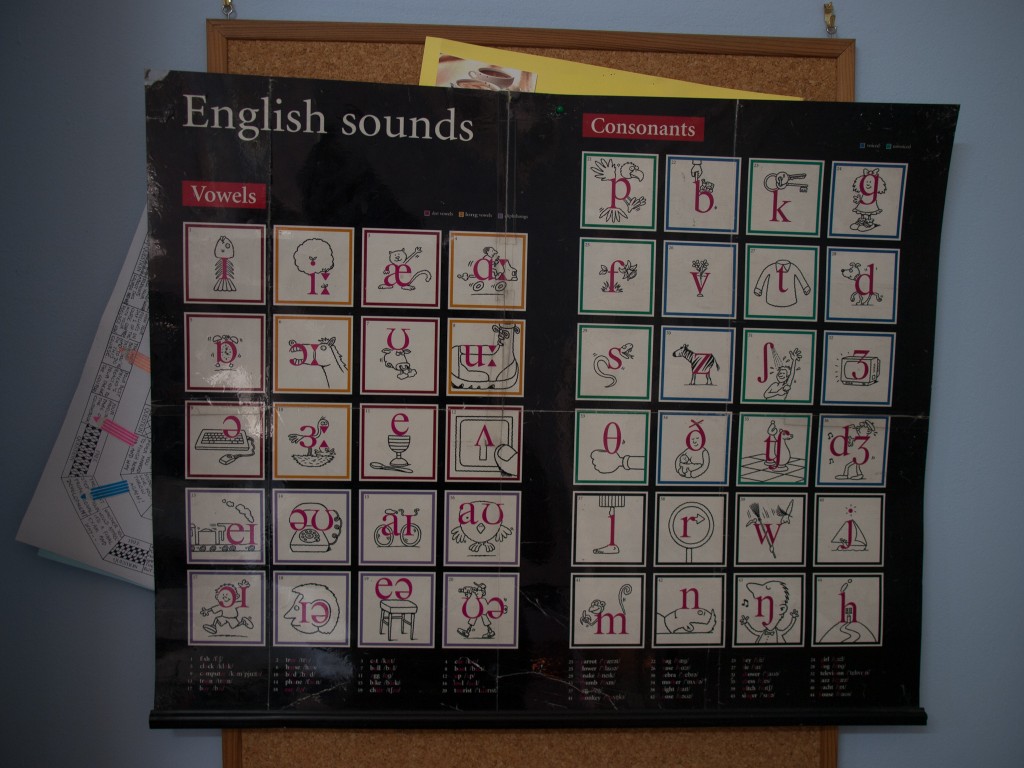
Oh, the things I heard about my teaching! I had never taught before, at least not in this “official” sense, and it showed. I was extremely nervous, kept staring at the whiteboard while writing my nonsensical teaching aids, had great trouble explaining in simple words things like the form and function of the present perfect or the lead-in for exercises… If those students hadn’t been as accustomed to other confusing teachers before me, they would have surely performed completely different tasks half the time, which they sometimes did. The tutors were brutal with their criticism at times, but it was all beneficial in the end: it helped me realise that one of my main and enduring weaknesses has been explaining things in simple and unconvoluted words even though, ever since (I remember having the same problem as well many times before), every time I realise I’m explaining something awkwardly or maybe unintelligibly, the self-consciousness still makes it almost impossible to explain in an empathic and efficient way. This will come with experience I suppose but it was one of the most important lessons. On top of that, we had to complete one assignment each weekend, which left us next to no free time at all.
My tutors, Alexander Makarios, George Vassilakis and Marissa Constantinides were all exceptional in their own ways and did an excellent job in making me kick off my teaching career. Thank you guys! My colleagues -Vaggelis, Daniel, Ioni, Chrysanthi, Pedro, Panayota, Margie, Theo and Kelly- I grew sick of and am glad I didn’t have to spend any more time together with them. Just look how much we hate eachother’s guts in the pictures and video:
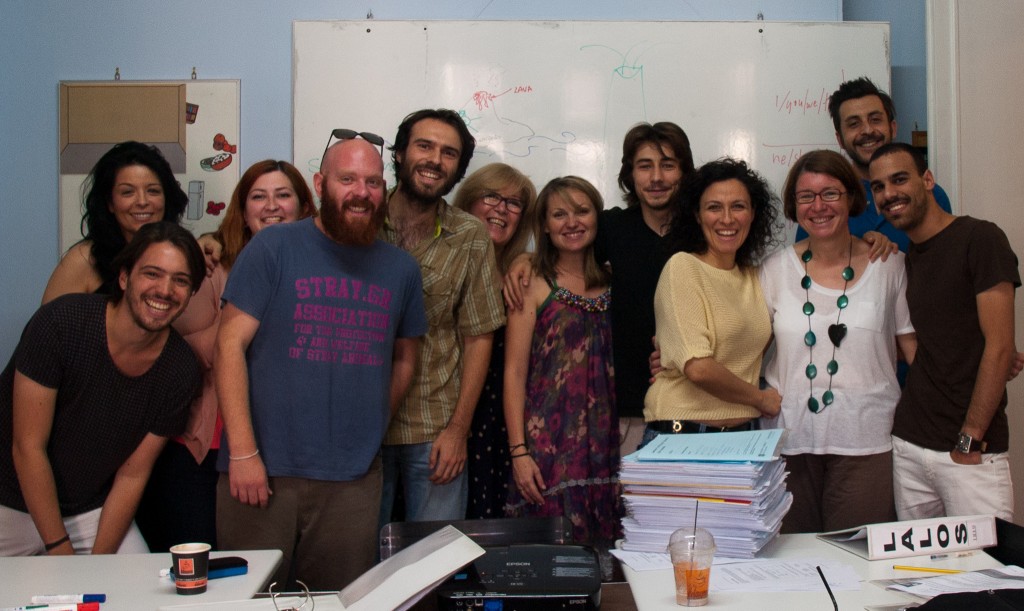
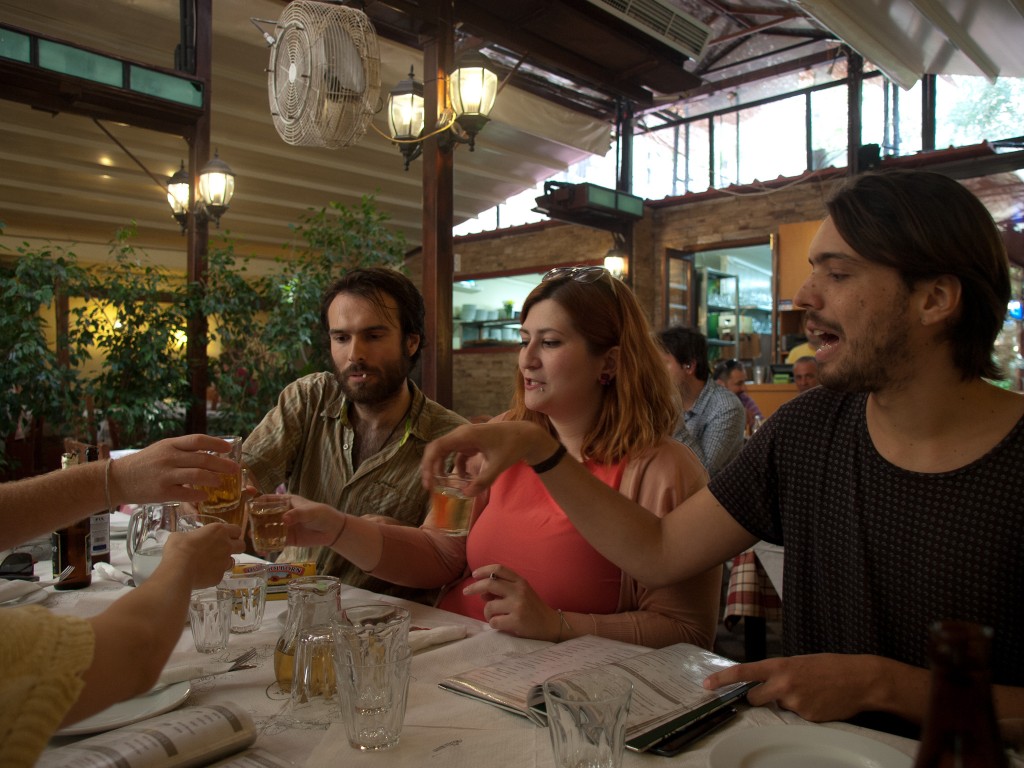
After I was done with the CELTA I was pumped to leave Greece and go teach English somewhere in the world with the coming of the new school year, preferably at a place in which I would be able to communicate with the locals in their native language. That was something that would exclude Japan -it’s a whole different chapter and dream- but would include Spain, Latin America and Germany/Austria, my B2 certificates for both languages fresh from early last summer and making me eager to get some real life experience with them as soon as possible!
But then the second thing happened.
Even before I had hugged my colleagues and tutors goodbye, desperate for some rest and some time to either think or not have to think at all, at the very least until the time I’d have to leave Greece to do my English-teaching duty, right then came the call for the Trip to Heterotopia. “For 21 days in Southern France we’re going to be a caravan visiting eco-communities, festivals, solidarity projects and groups. We will be wildcamping, so bring your tents, sleeping bags and headlamps!” At first I was very sceptical. I was tired and longed for doing nothing, as I mentioned above. It was only little more than a month since I’d been abroad last and, frankly, I felt as if I’d had enough flying around with backpacks, having to wait in airoports and making new temporary friendships, for the year at least. I reluctantly applied anyway; the idea seemed just too good to skip altogether.
To my surprise, I was actually selected, albeit at the last moment. When I talked with Chrysostomos, the head of European Village (the sending organisation) about the specifics, I warned him that my financial situation was at its usual low. He told me that all the costs together would amount to 120€. A hundred and twenty. I was shocked.
-“What’s the catch?” I thought I was being clever. “What’s the cost of participation?”
-“None. We’ve decided not to have one. Our current budget allows us to handle all the costs; it will be better and more convenient than passing them down to the travellers.”
That was it. 120€ would be cheaper even than staying in Athens for the same amount of time. Dafni wasn’t too happy with the suddenness of it all (we had made various plans for August already) but she was a sweet little understanding raccoon in the end and anyway had her own plans.
So there was us: 10 Greeks, and another 15 French people in it for the three weeks of the exchange. Together we visited five different locations and stayed some days in each, did wildcamping in every place, took part and volunteered for local festivals, picked organic vegetables from the community gardens and patches, learned how to build and use dry toilets (it’s not as bad as it sounds actually), participated in workshops on eco-building and local seed trading, there even was a Greek night dedicated to the Crisis. Our flag”ship” motor vehicle was the Vagabond Sage, a retrofit ’70s coach complete with dry toilet, wind generator and solar panels. We did not use all of its features but it was the symbol of our Trip in the French Heterotopias, the utopias that really exist.
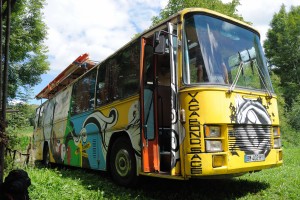
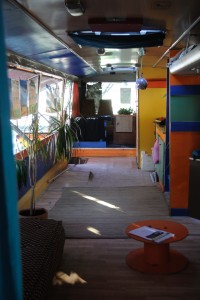
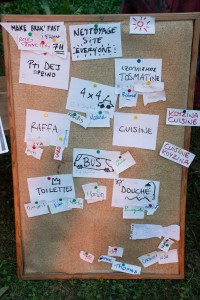
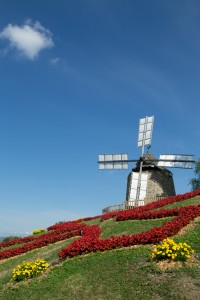
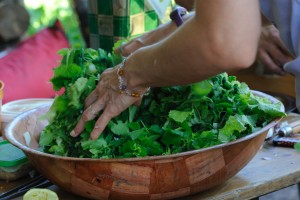
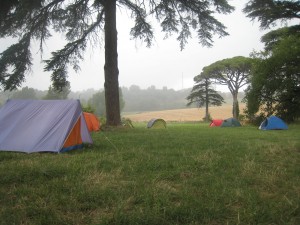
All pictures by Marina, Myrto and Caro (I apologise for the terrible formatting of the pictures above. The gallery couldn’t come out right. I think it’s time for a new theme anyway...)
The experience from those three weeks is hard for me to put into words, not unlike much of the rest of my life. The trip was very practical: we had to pack stuff, unpack stuff, cook most meals from scratch (and cater for close to 30 people at times), deal with stuff changing places and having to ask about their whereabouts (looking at you, coffee and coffeejugs!), set up tents, build dry toilets and showers, empty said toilets, and many more things I’m generally not good at, the cerebral rather than practical, abstract rather than present, clumsy and unwieldy person that I generally am. I was much happier sitting somewhere writing my morning pages (more on those in the near future) or enjoying the sun than really helping to prepare dinner, for example, but not being really useful filled me with guilt. I felt that this separated me from the rest of the group and made it harder for me to contribute to our common goals and tasks. Sure, learning about eco-friendly and transitional practices was heaps of fun and super-interesting; connecting with the French and the Greeks was exciting and fun and there was all this adventure and thrill of moving from place to place and exploring rural Southern France, but I always had this nagging feeling that alone I could not do this, that somehow I wasn’t the right person for it. Once again, as I have too many times before to count, I felt like the black sheep. Or rather a sophisticated, colourful goat among a herd of sheep that has none of the definite deviant prestige that black sheep usually have but instead has a certain, perhaps misplaced, idea of superiority. When that idea is threatened and attacked by no-one in particular but, at the same time, everyone at once, I can be very reclusive and pensive. I was the city kid in a group of people who lived and breathed nature, it seemed. Thankfully, there were other people in the Greek group with whom I could share the feeling.
(Video I made with Phoenix for Daphne. Phoenix is the little fox she got for me while we were in Finland. The video is in Standard Definition, unfortunately.)
At the same time, I know that what we did in that trip is important and is the future. Anything that could make me and others more self-sufficient, make us able to take our own situations into our hands, free to lead our lives as we please, is important in this age of destroyed opportunities, slave wages and fear-mongering. We had some discussions on self-reliance around our almost daily nightly fire, watched a couple of movies that inspired me to take action one way or another (more specifically Να Μην Ζήσουμε Σαν Δούλοι), but most of all it was the people who took part, with their lifestyle and their choices, that made me think and feel.
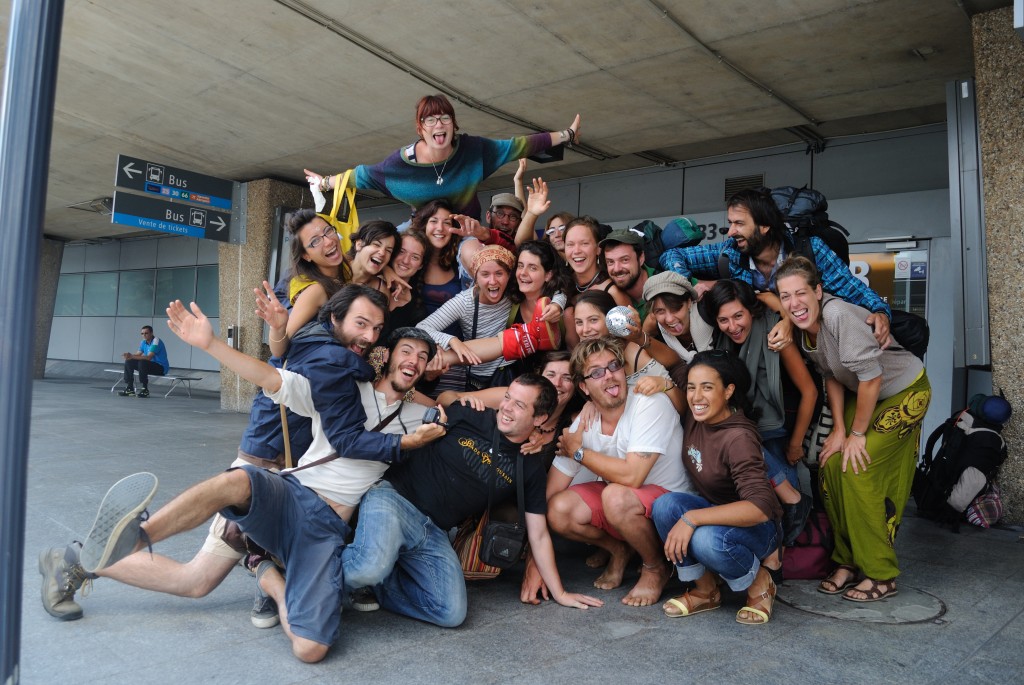
To cut a long story short, by the time we had got back to Greece I didn’t really want to leave immediately to find a job abroad. I had this feeling that staying here in Athens might not be so futile if I can find a way to use my time actively and creatively. Additionally, I felt and still feel that there’s lots of shit I have to figure out, reconcile, get over or leave behind before I can start something new. Putting some order to my digital belongings, selling or giving away stuff, giving time and energy to learn from everything that has happened in my life recently is really what I need but keep postponing due to distractions. Part of me tells me it’s all still being lazy and that purposefully skipping the opportunity to work abroad when I had it is regrettable, not to say of suspicious motivation on my part.
What appeared instead, however, is an excellent testament to the power of serendipity and letting the flow guide your path. Even if I missed the teaching abroad deadlines, there’s a very good possibility I will still be leaving the country after all to do my EVS (European Voluntary Service). Since there’s nothing urgent to do, might as well take advantage of my extended gap years while at the same time being independent for a change.
The real big questions in my head right now have to do with what path I should follow: one focused on living in the moment, taking advantage of opportunities as they come (the EVS and YIA side), discovering the Heterotopias that exist right under our noses and applying myself to that, or the other, in which I’ll make myself more qualified for actual work (which could be in the form of a MA in Prolonged Indecisiveness) or, yes, getting money and building the foundation for future survival? Certificates or Heterotopias? Playing it by ear as I’ve done a lot lately, or gearing up for the mystical tomorrow-never-comes “adult life”, which some would argue can’t include working as an English teacher abroad? /s
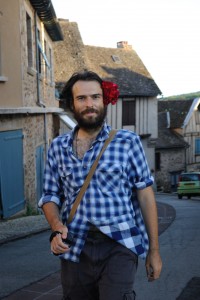
From where I’m standing at the moment, the hopefully upcoming EVS looks like it might be able to combine the best of both worlds for me: independence, creativity, new experiences as well as involving myself with things that might benefit my future options of getting by. Still, it’s too fresh to announce anything concrete. If I’m finally doing it (my application’s in the notorious EVS red tape maze right now), which I should know by December, I’ll be leaving for Bulgaria in January 2014 and will be living there for close to a year working for Sofia City Library. That will involve updating their volunteer-run blog, creating promotional media for the library and, from what I can tell, having relatively lots of freedom to pursue my own projects.
What will happen next and whether or not I’ll manage to take advantage of the months ahead will depend entirely on my own ability to balance, prioritise and purge, while at the same time not leaving the flow. OK, maybe not entirely: the current monumental instability of the world will provide us all with some interesting distractions, surprises, dangers and wild card paradigm shifts. One thing’s for sure: we already have absolutely no excuses to feel bored.

